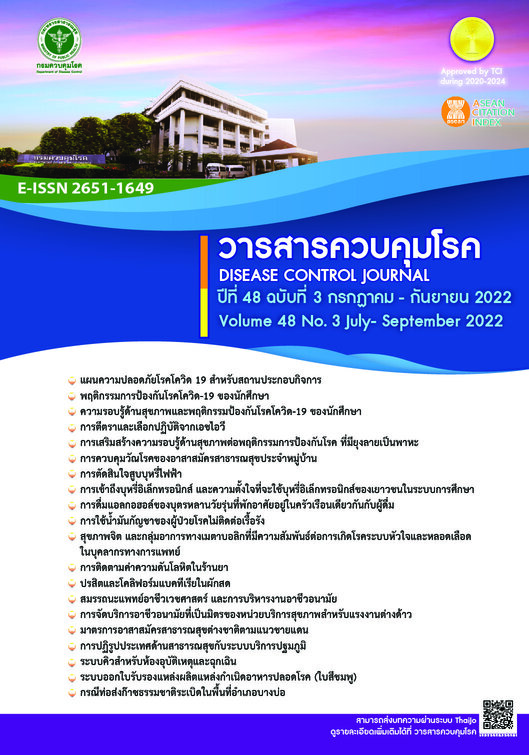Psychological hazards and metabolic syndrome related to cardiovascular disease among healthcare personnel in a hospital, Chonburi province
DOI:
https://doi.org/10.14456/dcj.2022.50Keywords:
psychological hazards, healthcare personnel, cardiovascular disease, metabolic syndromeAbstract
This descriptive research study using historical data (Retrospective study) from secondary data combined with a cross sectional study aim to investigate relationship between the occupational phychological hazards and metabolic syndrome with the occurrence of cardiovascular disease among healthcare personnel in a hospital, Chonburi Province, Thailand. There were eligible 281 healthcare personnel consists of 55 male (19.6%), 226 female (80.4%), Average age was 47.27 years (SD=6.93). Subjects at risk of Metabolic syndrome (Mets) was 208 (74%) and 73 (23%) for Mets. Relationship to cardiovascular diseases was investigate between Personal health profile, Occupational psychological hazards and metabolic syndrome status. Univariate analysis found that 4 variables were statistically significant (P< 0.05) as Female OR=0.38 (95%CI0.20-0.70), Age > 50 years OR=0.45 (95%CI 0.27-0.76), Working years > 25 years OR=1.9 (95%CI 1.12-3.21) and Mets OR=2.08 (95% CI 1.12-3.21), respectively. All variables were considered by Binary Logistic Regression, Female (Adjusted OR=0.28), Physical inactivity (Adjusted OR=2.48), Mets (Adjusted OR=2.07), moderate and severe anxiety (Adjusted OR=2.98) there were all factors that could predict the incidence of cardiovascular disease by 20%. Whereas, Female variable was discordance to cardiovascular events incidence in Thailand and aboard countries that found in males more than females may be explained from the nature of this population group.
Downloads
References
Non-communicable division. Department of Disease Control. Ministry of Public Health (TH). Issues in campaign for the day of heart disease. 2019. (in Thai)
Mottillo S, Filion KB, Genest J, Joseph L, Pilote L, Poirier P, et al. The Metabolic Syndrome and Cardiovascular Risk : A Systematic Review and Meta-Analysis. Journal of the American College of Cardiology. 2010;56(14 ):1113-32.
Fadel M, Sembajwe G, Gagliardi D, Pico F, Li J, Ozguler A, et al. Association Between Reported Long Working Hours and History of Stroke in the CONSTANCES Cohort. AHA Journal. 2019;50(7):1879-82.
Talmage JB, Melhorn JM, Hyman MH. AMA guides to the evaluation of work ability and return to work 2nd ed. 2011:49-50.
Techarujira K, Leelahakul V, Changmai S. The outcome of behavior change program to reduce the risks of cardiovascular disease in the staffs with metabolic syndromeat a private hospital. Journal of Charoenkrung Pracharak Hospital. 2019;15(2):14-33. (in Thai)
Pumfang S, Srisatidnarakul B. Factors of Job Stress for Professional Nurses in Tertiary Hospital. Kuakarun Journal of Nursing. 2015;22(2):140-53. (in Thai)
Bangxang JN. Resident Burnout: Prevalence and Associated Factors in Rajavithi Hospital. J Psychiatr Assoc Thailand 2019;64(1):61-76. (in Thai)
Detection NCEPEPo, Adults ToHBCi. Third report of the National Cholesterol Education Program (NCEP) Expert Panel on detection, evaluation, and treatment of high blood cholesterol in adults (Adult Treatment Panel III): The Program; 2002.
Krejcie RV, Morgan DW. Determining sample size for research activities. Educational And Psychological Measurement. 1970;30:607-10.
Phakthongsuk P, Apakupakul N. Psychometric properties of The Thai version of the 22-item and 45-item Karasek Job Content Questionnaire. International Journal of Occupational Medicine and Environmental Health. 2008;21(4):331-44.
Oei TPS, Sawang S, Yong WG, Mukhtar F. Using the Depression Anxiety Stress Scale 21 (DASS-21) across cultures. International Journal of Psychology. 2013;48(6):1018-29.
Department of Disease Control (TH). Coronary Artery Disease (CAD) REPORT. 2018.
Chen WL, Wang CC, Chiang ST, Wang YC, Sun Y, Wei WT, et al. The impact of occupational psychological hazards and metabolic syndrome on the 8 year risk of cardiovascular diseases—A longitudinal study. PLOS one. 2018;13(8).
Esquirol Y, Perret B, Ruidavets JB, Marquie JC, Dienne E, Niezborala M, et al. Shift work and cardiovascular risk factors: New knowledge from the past decade. Archives of Cardiovascular Diseases. 2011;104(12):636-68.
Mark H, Molloy GJ, Emmanuel S. Psychological distress as a risk factor for cardiovascular events: pathophysiological and behavioral mechanisms. Journal of the American College of Cardiology. 2008;52(25):2156-62.
Vaccarino V, Shah AJ, Mehta PK, Pearce B, Raggi P, Bremner JD, et al. Brain-heart connections in stress and cardiovascular disease: Implications for the cardiac patient. Atherosclerosis. 2021;328:74-82.
Ginty AT, Kraynak TE, Fisher JP, Gianaros PJ. Cardiovascular and autonomic reactivity to psychological stress: Neurophysiological substrates and links to cardiovascular disease. Autonomic neuroscience : basic & clinical. 2017;207:2-9.
Kivimäki M, Steptoe A. Effects of stress on the development and progression of cardiovascular disease. Nature reviews Cardiology. 2018;15(4):215-29.
Thangtham W, Klumpakorn S, Lumkampan S. Predictive Factors associated to stress in workplace among male nurse in Thailand. Journal of Nursing Division 2014;41(2). (in Thai)
Cui R, Iso H, Toyoshima H, Date C, Yamamoto A, Kikuchi S, et al. Body mass index and mortality from cardiovascular disease among Japanese men and women: the JACC study. Stroke. 2005;36(7):1377-82.
Chueybudda S. Factors Affected to Risk of Cardiovascular Disease Among People aged over 35 year old in Nong Bua subdistrict, Ban Fang District, Khon Kaen. Community Health Development Quarterly Khon Kaen University. 2015;3(4):547-60. (in Thai)
Karasek R, Theorell T. Healthy work: Stress, productivity, and the reconstruction of working life. New York: Basic Book; 1990.
Tang F, Wang G, Lian Y. Association between anxiety and metabolic syndrome: A systematic review and meta-analysis of epidemiological studies. Psychoneuroendocrinology. 2017;77:112-21.
Downloads
Published
How to Cite
Issue
Section
License
Copyright (c) 2022 Disease Control Journal

This work is licensed under a Creative Commons Attribution-NonCommercial-NoDerivatives 4.0 International License.
Articles published in the Disease Control Journal are considered as academic work, research or analysis of the personal opinion of the authors, not the opinion of the Thailand Department of Disease Control or editorial team. The authors must be responsible for their articles.






